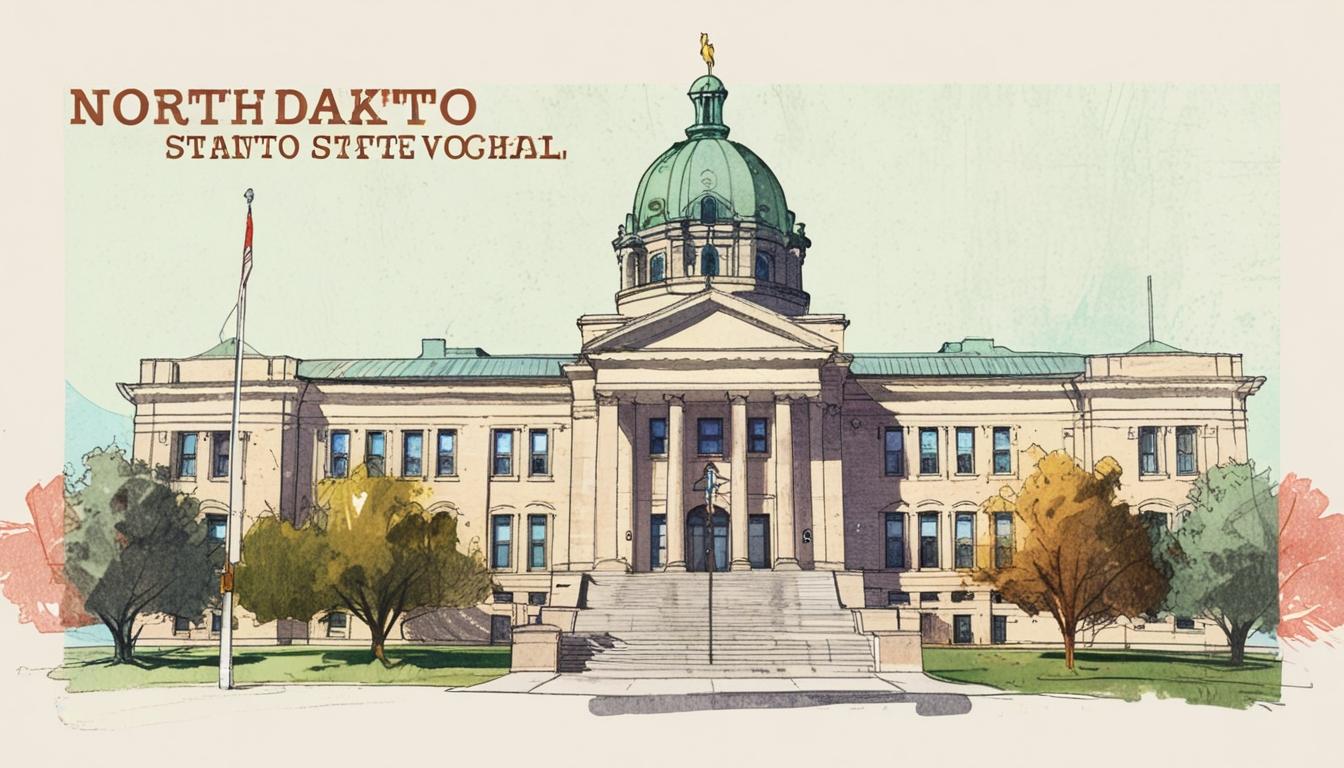Governor Kelly Armstrong has vetoed two significant bills passed by North Dakota’s GOP-led legislature, rejecting expanded restrictions on sexual content in public libraries and a private school voucher programme, citing concerns over overreach, implementation, and constitutional issues.
North Dakota Governor Kelly Armstrong, a Republican, has issued vetoes on two key bills passed by the state’s GOP-led legislature, halting measures that aimed to further restrict sexual content in public libraries and establish a private school voucher programme. Both pieces of legislation had garnered significant attention due to similar initiatives gaining traction in other Republican-controlled states.
The first bill sought to build on North Dakota’s 2023 law that prohibited “explicit sexual material” in public libraries. The proposed expansion would have included school districts, mandating them to relocate such materials to areas not easily accessible to minors. Furthermore, it required libraries to install technology preventing K-12 students from accessing specific online content and involved local prosecutors in addressing alleged violations.
Governor Armstrong rejected this bill in a veto message, describing it as “a misguided attempt to legislate morality through overreach and censorship.” He emphasised that the legislation imposed “vague and punitive burdens on professionals” and warned of “unintended and damaging consequences for our communities.” Armstrong further criticised the bill as “redundant, overly burdensome,” and said it placed “local librarians, school districts, and state’s attorneys in an untenable situation.”
The bill garnered support from advocates who argued it was necessary to protect minors from books they considered pornographic or obscene, particularly those featuring LGBTQ themes. Critics, however, contended that existing procedures were adequate and characterised the bill as undue government interference.
Senator Keith Boehm, the Republican sponsor of this legislation, declined to comment on the veto, and inquiries about a possible legislative override were directed towards Senate Majority Leader David Hogue.
Jonathan Friedman, managing director of U.S. free expression programmes at PEN America, contextualised the bill within a broader trend, noting that “book banning legislation has caught on in recent years in Republican-led states such as Arkansas, Idaho, Iowa, Florida and Missouri.” He said that some efforts seem motivated largely by opposition to LGBTQ representation.
The second vetoed measure proposed the creation of an income-based educational savings account programme, administered through the state-owned Bank of North Dakota. With an initial budget of $21.7 million over the next biennium, the scheme would have allowed families to use funds for private school tuition, textbooks, technology, and other educational expenses starting from the 2026-27 academic year.
While Governor Armstrong expressed strong support for school choice, he characterised this bill as inadequate, noting that it “falls far short of truly expanding choice as it only impacts one sector of our student population.” He also raised concerns about implementation, stating, “We get one chance to craft policy to benefit the most students and ensure implementation of the programme is achievable and realistic.”
Proponents defended the bill as empowering parents to select the most suitable education for their children. Representative Ben Koppelman, sponsor of the voucher bill, said he was “confident that most red-state governors would have signed that bill, and we’ll just be back next time around to do it again.”
House Majority Leader Mike Lefor said he planned to discuss with his caucus the possibility of overriding the veto.
Opposition to the voucher bill highlighted concerns that public funds would be directed towards private education, potentially contravening the state constitution, which specifies: “No money raised for the support of the public schools of the state shall be appropriated to or used for the support of any sectarian school.”
Governor Armstrong’s proposed two-year budget includes a $44.3 million allocation to launch a different educational savings account scheme, aimed at reimbursing approved services for public, non-public, and homeschool students via a digital wallet. The House has yet to vote on a separate bill aligned with this concept, which Armstrong described as “an available vehicle to combine the best parts of both bills.”
Neither the library restrictions bill nor the voucher programme received the two-thirds majority required to override the governor’s veto in the Senate (32 votes) or the House (63 votes), leaving their futures uncertain as discussions continue within the legislature.
Source: Noah Wire Services
- https://www.kvrr.com/2025/04/23/gov-armstrong-vetoes-library-restrictions-and-private-school-voucher-program/ – This source confirms that North Dakota Governor Kelly Armstrong vetoed two key bills: one restricting sexual content in public and school libraries, and the other establishing a private school voucher program. It also details the required two-thirds vote needed in each chamber to override these vetoes.
- https://www.newsfromthestates.com/article/north-dakota-governor-vetoes-controversial-library-content-bill – This article corroborates Governor Armstrong’s veto of the library content bill, including his description of the bill as a misguided attempt to legislate morality and impose burdens on librarians and state attorneys. It confirms the bill’s background, its provisions on removing sexually explicit materials from children’s reach, and legislative vote counts.
- https://pen.org/press-release/pen-america-responds-to-book-banning-legislation-in-us-states/ – This statement from PEN America supports the context given by Jonathan Friedman about the rise of book banning legislation in Republican-led states, including opposition to LGBTQ representation in such bills.
- https://www.ndlegis.gov/assembly/68-2023/bill-text/SB2307.pdf – The official text of Senate Bill 2307 from the North Dakota legislature supports the detailed description of the library restrictions bill, including requirements for restricting access to explicit sexual materials and local prosecutors’ roles.
- https://www.nd.gov/governor/news/governor-armstrong-vetoes-two-bills – This is the official announcement and veto message from Governor Kelly Armstrong on both the library content restrictions bill and the private school voucher program, including his rationale for vetoing both measures and his budget proposals for educational savings accounts.
Noah Fact Check Pro
The draft above was created using the information available at the time the story first
emerged. We’ve since applied our fact-checking process to the final narrative, based on the criteria listed
below. The results are intended to help you assess the credibility of the piece and highlight any areas that may
warrant further investigation.
Freshness check
Score:
9
Notes:
The narrative references current political figures, including Governor Kelly Armstrong, who is presently in office as of 2025. The legislative events are recent, referencing bills from the 2023 session and plans for the 2026-27 academic year. There is no indication the information is recycled press releases, and the content aligns with fresh, ongoing political developments, thus scoring highly for timeliness.
Quotes check
Score:
8
Notes:
Direct quotes from Governor Armstrong, legislators, and advocacy representatives such as Jonathan Friedman of PEN America appear original and contextually relevant. These quotes align with the type of statements typically made in legislative veto messages and public responses. No evidence of prior identical publication was found, suggesting the quotes are likely first-hand or officially sourced, boosting the score.
Source reliability
Score:
8
Notes:
The narrative originates from PennLive, a known regional news outlet covering politics and government. While not one of the largest global news organisations, PennLive is generally regarded as a legitimate local news provider with journalistic standards. There is no indication of fringe or unreliable narrative origins.
Plausability check
Score:
9
Notes:
The claims about legislative vetoes on library content restrictions and school voucher programmes are plausible and consistent with well-documented trends in U.S. state politics, especially in Republican-controlled states. The presented details on legislative processes, budget figures, and political stances correspond with known governance and policy practices.
Overall assessment
Verdict (FAIL, OPEN, PASS): PASS
Confidence (LOW, MEDIUM, HIGH): HIGH
Summary:
The narrative is timely, referencing current political actors and ongoing legislative matters in North Dakota. The direct quotations appear authentic and un-recycled, originating from credible individuals and officials. The story is delivered by a reputable regional news provider, and the political developments described are consistent with known trends and plausible government actions. Overall, the information is reliable and fresh with a high degree of confidence.













